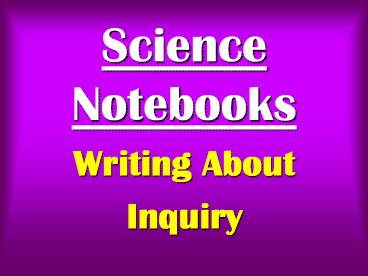Science Notebooks PowerPoint PPT Presentation
1 / 38
Title: Science Notebooks
1
Science Notebooks
- Writing About
- Inquiry
2
Science NotebooksWriting About Inquiry
Brian Campbell and Lori Fulton
- ISBN 978-0-352-00568-3
- www.heinemann.com
- List Price 21.25
- Web Price 17.00
- Grade Levels 2-6
3
Using Science Notebooksin the Elementary
Classroom
- ISBN 978-1-93353-103-8
- www.nsta.org
- NSTA Science Store
- Member Price 19.96
- Nonmember 24.95
- Grade Levels K-5
Michael P. Klentschy
4
Writing Tools
JOURNAL A book where students write reflections
about their learning. Normally used after an
activity or investigation is done and materials
are put away. LOG A book where students record
data over time. Normally used during the
procedure of an investigation but not during
class discussion. NOTEBOOK A book where
students record notes, technical drawings,
observations, data, what they think and what they
have learned as they do science. Used before,
during, and after science investigations and is
an authentic reflection of their knowledge and
skills.
5
Purpose of aScience Notebook
- To build science content and process skills.
- To increase student participation and practice in
science, math, writing and communicating. - To assess student achievement formatively.
6
What can I use?
- Composition books
- Spiral notebooks
- Three ring binders
- Three-prong paper folders
- Folded stapled paper
7
Where to begin?
- What will students regularly write about in their
notebook? - What should be included with every student entry?
- What organizational tools and learning strategies
should students use? - What experiences will provide students with
meaningful experiences?
Use the Science Notebook Thinking Points to
insure your notebooks stay authentic to learning
science
8
Develop a Regular Routine
Teacher Role Student Participation
- Introduction Record your prior
knowledge/KWL/OWL - Hypothesis Write your prediction
- Materials Identify your science tools
- Procedure Do the activity and record your data
- Observations Draw and label what happens
- Question/Analysis Write what you are thinking
- Conclusion Write what you learned
- Communication Share team results with class
- Reflection Expository writing/poem/song-rap
Have students critique their own knowledge and
skills
9
What should a Science Notebook look like ?
10
DRAWINGS
Kindergarten
Grade 2
11
DIAGRAMS
Grade 5
Grade 4
12
TECHNICAL VS. DRAWINGS
Labels
No Labels
13
CLASS NOTES
Grade 5
Grade 5
14
CONCEPT MAPS
Grade 4
15
EXPERIMENTS
Grade 1
Grade 3
Grade 5
Grade 2
16
GRAPHIC ORGANIZERS
Grade 2
Grade 4
FOOD WEBS
ENERGY PYRAMIDS
17
DATA TABLES
Grade 3
Grade 5
18
GRAPHS
Grade 4
Grade 2
Grade 5
Grade 1
19
WRITING
Grade 1
Grade 2
Grade 4
20
REFLECTION
Grade 5
21
My Science Notebook
- Hand outs
22
Work With Students On
- Drawing and recording observations
- Measuring and recording data
- Calculations and graphs
- Reflecting and writing about what they learned
23
Practice
- Making Predictions
- Making Technical Observations
- Recording Data
- Measuring and Doing Calculations
- Graphing Data
- Making Inferences
- Expository Writing
24
Review with Students
- Self Reflection
- Peer to Peer Review
- Summative Assessments
- State Assessments
- Year to Year
25
(No Transcript)
26
Authentic Learning Tool
- Real scientists use science notebooks all the
time. For this reason, using science notebooks to
teach is a very authentic learning experience. - Here are some real examples of some incredible
science notebook pages.
27
Einsteins Notebook
Theory of Relativity
28
Galileos Notebook
Drawings of the moons of Jupiter
29
Observing Phases of the Moon
Water Color by Galileo
Photograph
30
Wilber Wrights Notebook
1903 Flyer
31
Darwins Notebook
Elementary Illustrations of Darwins Ideas
32
Leonardos Notebook
Vitruvian Man
33
Any Questions?
34
November 12-14, 2009.
DIVE INTO SCIENCE! www.fastscience.org
35
Diving Into the Next Generation of Science
- STRANDS INCLUDE
- Enhancing Science Teaching and Learning with
Instructional Technology. - Teaching Ecosystems, Climate, and Climate Change.
- Keys for Student Success Curriculum Integration
and Student Inclusion.
36
Members Save 74 on Conference Registration
Go to www.fastscience.org/membership.aspx
37
GRANTS AVAILABLE
- TRAVEL GRANTS to Ft. Lauderdale to attend the
NSTA Area Conference . Both FAST BaP
Opportunities up to 500 www.FastScience.Org - TEACHER CLASSROOM GRANTS for projects and
hands-on activities up to 1000
www.FastScience.Org - PROFESSIONAL DEVELOPMENT SCHOLARSHIPS to the NSTA
Learning Center for teachers for annual
subscriptions (full year) www.FastScience.Org
38
Thank You!
Thomas Medcalf 2009, FAST President

